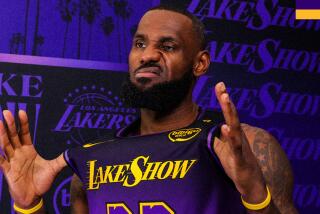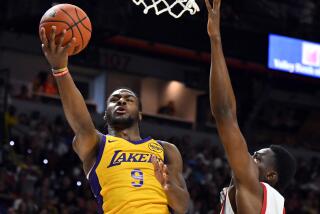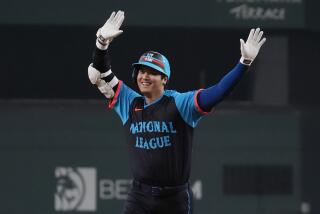When the Los Angeles Lakers take to...
When the Los Angeles Lakers take to the floor of the Staples Center next Sunday against the Golden State Warriors, they’ll be wearing the retro uniforms of the 1987-88 championship Lakers, as part of the NBA’s heritage week program.
“It isn’t so different from the current uniform,” says John Black, the Lakers’ vice president of public relations. “The uniform hasn’t really changed much over the last 20 years.”
With all due respect, that’s like saying men’s suits haven’t really changed much since there was only one Brooks brother. In the last two decades alone, the team colors have shifted, silhouettes have relaxed, fabrics have gone space-age and the outseam on the shorts has headed about 4 inches south. Look back four more decades -- the Lakers are marking their 60th season (it’s right there on a patch on their current uniforms) -- and it’s hard to believe the belted boxers and polyester jerseys of their Minnesota forebears are in the same league literally or aesthetically.
Powder-blue short shorts (1947-1960)
The 1940s league uniforms are custom-made in each city, consisting of satin shorts and heavy polyester jerseys trimmed in a standard stripe. For the Minneapolis Lakers, that means white home uniforms trimmed in blue and powder blue trimmed in “gold” (yellow to the rest of the world) on the road. Shorts are belted, hit above mid-thigh and hug the leg. Despite looking like they are sporting outsized baby rompers, the Lakers pull down five league championships.
Royal blue (1960-1967)
In perhaps a symbolic move reflecting the move from the shallow lakes of Minnesota to the depths of the Pacific Ocean, the Lakers’ migration brings the uniforms a few shades darker, royal blue with accents in a lighter shade of blue. They add details: a cursive “Los Angeles” on the front of the jerseys, “Lakers” on a contrasting side panel on the short. The patella-grazing striped knee sock that gained popularity across the league in the ‘50s becomes standard-issue.
Forum blue (1967-2001)
The biggest change in the Lakers palette comes with the move to the Forum in 1967. Owner Jack Kent Cooke decides to dress his L.A. Kings and the Lakers in “royal purple and gold.” Although he likes the hue, he supposedly hates the word “purple,” so the team’s official colors are referred to as “Forum blue and gold.”
In the early ‘90s, shorts are baggier and creep toward the knee league-wide, a look popularized by the University of Michigan’s “Fab Five” freshmen starters of 1992, and one that is easier to achieve once the NBA shifts to a single supplier of uniforms. “After we struck a deal with Champion, they went out and measured all the players and started offering custom sizing, so in the ‘90s we saw a lot of the longer shorts happening,” said Christopher Arena, an NBA vice president who oversees apparel.
Purple and gold (2001-present)
The Lakers’ media guide drops the “royal” from the purple without changing the shade an iota. It continues to insist that “yellow” is “gold.”
Sunday whites (2002-present)
Although NBA regulations have long stipulated that home uniforms are to be white (a leftover from the days when doing laundry on the road was a dicey proposition and no one wanted an all-gray league), the Lakers’ “gold” uniforms were grandfathered as exempt. But leave it to the Lakers to add one anyway -- and become the only team with an alternate home uniform. They play the first game in “Sunday whites” (white with gold side panels and trimmed in purple) on Christmas Day 2002.
According to the Lakers’ Black, the white uniforms are for Sunday home games and “special occasions.” In April 2006, coach Phil Jackson blames the team’s poor string of Sunday performances on the uniforms. “They look like little elves and fairies out there,” he says of the white outfits. “The real uniform of the Lakers is the home uniform, which has always been what it is -- they have blue on the road and gold at home. This is something that has advanced in the last five or six years as we sell more uniforms and make more money.”
OK, so the grumpy Zen master has a point. The fashion world is built on the idea that things change and consumers keep on buying. If you’ve got a Kobe Bryant jersey in home yellow and road purple, perhaps you’d like one in white too?
And if Sunday’s game leaves you longing for a throwback jersey circa ‘87, you can buy that too.
--
More to Read
All things Lakers, all the time.
Get all the Lakers news you need in Dan Woike's weekly newsletter.
You may occasionally receive promotional content from the Los Angeles Times.








